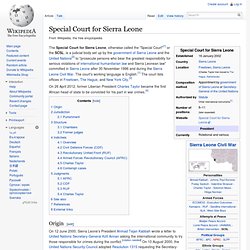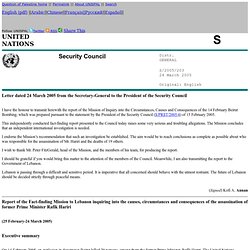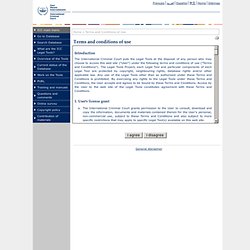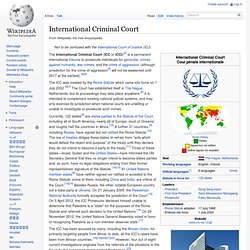

ICC Coalition. Leave None to Tell the Story: Genocide in Rwanda (Human Rights Watch Report, March 1999) UN ICTR Report. ICTR Status of Detainees. Orentlicher Bosnia Article. Kosovo - Forensics of War. The first big massacre occurred in March 1998, when Serb forces surrounded the village of Prekaz and wiped out 58 civilians, many of them women and children.

The attack was in retaliation for a shoot-out between K.L.A. and Serb police a couple of weeks earlier, and it was the beginning of a horrible symbiosis between the two forces. Every time the K.L.A. carried out a guerrilla attack, Serb forces would destroy the nearest village and massacre as many of the inhabitants as they could. And every time the Serbs massacred people in a village, more grief-stricken survivors joined the K.L.A. “For every massacre Serbs commit, we get 20 more recruits,” one K.L.A. commander told a journalist friend of mine a few weeks before the nato bombings started.
Ethically speaking, there’s an extremely thin line between ambushing Serb forces and deliberately provoking Serbs into massacring civilians, but the strategy worked. As idealistic as it was, the idea had inherent flaws. SCSL Wiki Summary. The Special Court for Sierra Leone, otherwise called the "Special Court"[1] or the SCSL, is a judicial body set up by the government of Sierra Leone and the United Nations[2] to "prosecute persons who bear the greatest responsibility for serious violations of international humanitarian law and Sierra Leonean law" committed in Sierra Leone after 30 November 1996 and during the Sierra Leone Civil War.

The court's working language is English.[1] The court lists offices in Freetown, The Hague, and New York City.[3] Origin[edit] On 12 June 2000, Sierra Leone's President Ahmad Tejan Kabbah wrote a letter to United Nations Secretary-General Kofi Annan asking the international community to try those responsible for crimes during the conflict. [citation needed] On 10 August 2000, the United Nations Security Council adopted Resolution 1315 requesting the Secretary-General to start negotiations with the Sierra Leonean government to create a Special Court.
Jurisdiction[edit] Punishment[edit] Sierra Leone Report.pdf. 2006 Expert Report on SCSL. Annex to 2006 SCSL Report. UN 2000 Report on SCSL. UN Report on Hariri Assassination. Letter dated 24 March 2005 from the Secretary-General to the President of the Security Council I have the honour to transmit herewith the report of the Mission of Inquiry into the Circumstances, Causes and Consequences of the 14 February Beirut Bombing, which was prepared pursuant to the statement by the President of the Security Council (S/PRST/2005/4) of 15 February 2005.

This independently conducted fact-finding report presented to the Council today raises some very serious and troubling allegations. The Mission concludes that an independent international investigation is needed. I endorse the Mission’s recommendation that such an investigation be established. The aim would be to reach conclusions as complete as possible about who was responsible for the assassination of Mr. Hariri and the deaths of 19 others. I wish to thank Mr. I should be grateful if you would bring this matter to the attention of the members of the Council. (Signed) Kofi A. I. ICC - Legal Tools: Go to Database. The International Criminal Court puts the Legal Tools at the disposal of any person who may choose to access this web site ("User") under the following terms and conditions of use ("Terms and Conditions").

The Legal Tools Project, each Legal Tool and particular components of each Legal Tool are protected by copyright, neighbouring rights, database rights and/or other applicable law. Any use of the Legal Tools other than as authorized under these Terms and Conditions is prohibited. ICC Wiki Summary. The International Criminal Court (ICC or ICCt)[2] is a permanent international tribunal to prosecute individuals for genocide, crimes against humanity, war crimes, and the crime of aggression (although jurisdiction for the crime of aggression[3] will not be awakened until 2017 at the earliest).[4][5] The ICC was created by the Rome Statute which came into force on 1 July 2002.[6][7] The Court has established itself in The Hague, Netherlands, but its proceedings may take place anywhere.[8] It is intended to complement existing national judicial systems, and may only exercise its jurisdiction when national courts are unwilling or unable to investigate or prosecute such crimes.

Trial history to date[edit] The Court's Pre-Trial Chambers have publicly indicted 36 people. The ICC has issued arrest warrants for 27 individuals and summonses to nine others. Eight persons are in detention.